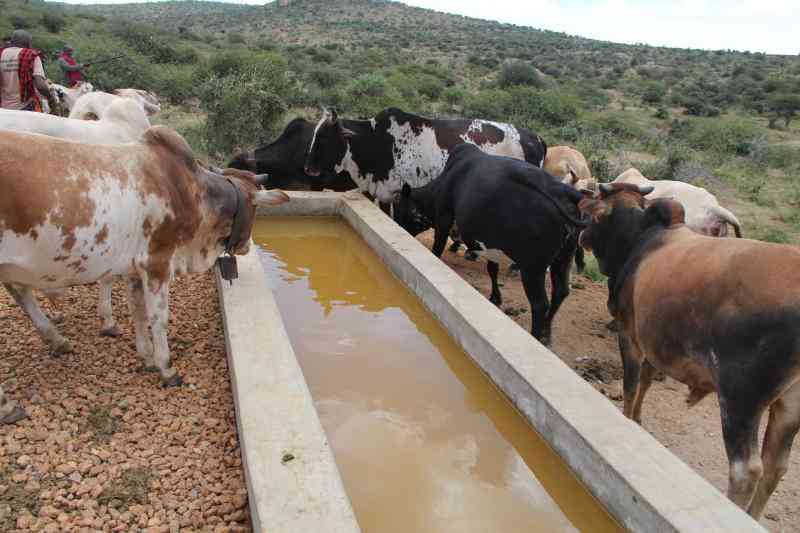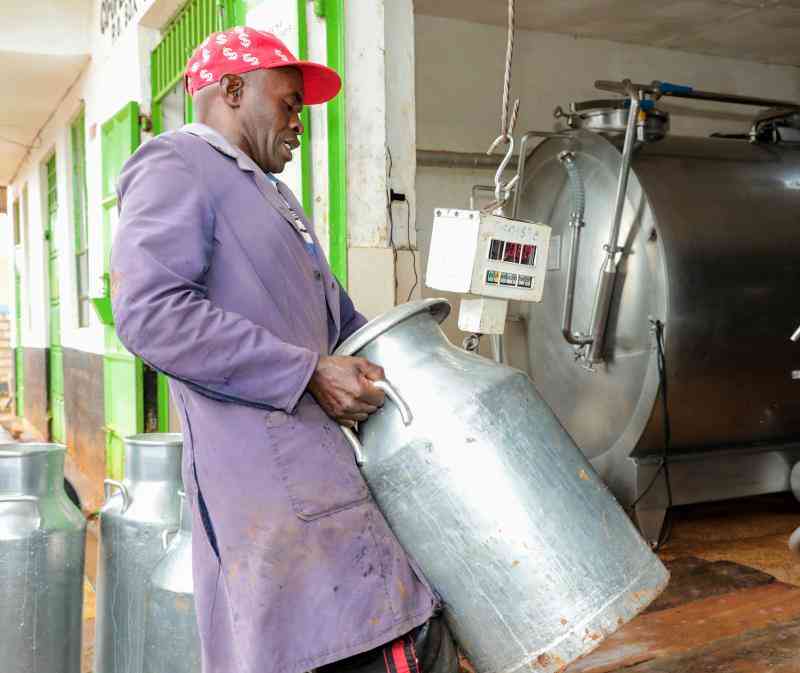Most local athletes are not known for much more than their commendable exploits on the track, but Paul Kipsiele Koech, a 3,000 metres steeplechase champion, is hoping to show his compatriots they can make a mark outside of running.
Mr Koech, 33, has become a dairy farmer of note in Bomet County. On his Kaso Farm in Kapchepkoro village, Sotik constituency, the athlete keeps 40 dairy cows and 13 calves. Most of the cows are Jersey and Friesian breeds, each valued at more than Sh200,000.
VALUE ADDITION
The 2010 Diamond League champion and 2004 Olympic bronze medal winner said the bug to begin rearing cattle bit him in 2003, and he started out with three local breeds.
“Five years later, I purchased five exotic cows, which I decided to rear in zero grazing units, and employed four farm hands,” Koech said.
Each of the cows at the farm provides an average of 20 to 30 litres of milk when they are milked at 6am, 10am and 6pm. The process is mechanised, and the milk sold to a milk-buying company in Nairobi.
Koech then ventured into value addition in 2008. At least four times a week, a portion of the milk he gets from his cows is taken to the farm’s micro milk-processing plant to make sour milk (mala) and yoghurt — which is branded Kaso and is available in strawberry and vanilla flavours.
“We sell a litre of yoghurt at a wholesale price of Sh120 to traders in Kericho, Bomet, Narok and Kisii counties,” Koech said.
“I decided to invest in a Sh1.2 million pasteuriser to make yoghurt and mala because most milk buyers purchase milk at low prices, yet the cost of feeding dairy cows and paying farm hands is high.”
He added that he keeps the quality of his herd high through artificial insemination (AI), using semen acquired from Holland and Canada.
“We also go for sex semen, therefore 90 per cent of the calves birthed at the farm are heifers,” he says.
Koech also credited his dairy farm’s success to meticulous farm records.
“We use ear tags, which help us trace a cow’s history and other important information. These details are very important during treatment, deworming and serving the cows to prevent in-breeding and other complications.”
PASSIVE IMMUNITY
Feeding at the farm is also well structured. Once a cow gives birth, the calf is allowed to stay with its mother for three to five days to suckle colostrum, which provides passive immunity and growth factors.
Stay informed. Subscribe to our newsletter
Afterwards, the calves are taken to pens, where each is fed five litres of milk a day and two kilogrammes of dairy meal for two to three months.
The calves are then moved to another pen, where they are held for six months. They are moved one more time and held until they are 18 months, which is when they are ready to be served; however, they must weigh at least 300kg.
“After the animals have been served, they are moved to a steaming up area in a separate unit where they receive special attention in terms of the food they get and other logistics as they are prepared for birth,” Koech said.
This unit also helps protect the cows from getting stressed or being head butted by other cows, thus preventing miscarriages.
To minimise the cost of buying feed for his herd, Koech has put 15 acres of his farm under maize.
“After slashing the maize stalk, it is chopped into pieces and piled up before being compacted by a tractor, which squeezes out the air. Afterwards, the heap is covered using nylon paper, and in this form, the silage can be preserved for years,” he said.
Besides maize, the athlete also grows desmodium, lusan, calliandra and sweet potato, which he uses to provide protein for his herd.
ADEQUATE FEED
Koech advises prospective dairy farmers to only keep the number of cows they can manage to feed adequately.
“If you keep more cows than you can feed, it will become a challenge to meet their needs, which means their milk production will be low.”
And nothing goes to waste in the farm, with cow dung used to produce biogas for cooking.
“Since we began using biogas, we have been able to save thousands of shillings. This gas has more heat than ordinary, commercial LPG (liquefied petroleum gas), and I wish there was a way to package and sell it,” said Koech’s wife, Irene.
Though Koech has a busy training schedule, he keeps tabs on his farm’s progress through Irene.
“I thank God for giving me a wife who doesn’t have any qualms running the farm to perfection when I am not around,” he said.
[email protected]
 The Standard Group Plc is a
multi-media organization with investments in media platforms spanning newspaper
print operations, television, radio broadcasting, digital and online services. The
Standard Group is recognized as a leading multi-media house in Kenya with a key
influence in matters of national and international interest.
The Standard Group Plc is a
multi-media organization with investments in media platforms spanning newspaper
print operations, television, radio broadcasting, digital and online services. The
Standard Group is recognized as a leading multi-media house in Kenya with a key
influence in matters of national and international interest.
 The Standard Group Plc is a
multi-media organization with investments in media platforms spanning newspaper
print operations, television, radio broadcasting, digital and online services. The
Standard Group is recognized as a leading multi-media house in Kenya with a key
influence in matters of national and international interest.
The Standard Group Plc is a
multi-media organization with investments in media platforms spanning newspaper
print operations, television, radio broadcasting, digital and online services. The
Standard Group is recognized as a leading multi-media house in Kenya with a key
influence in matters of national and international interest.








